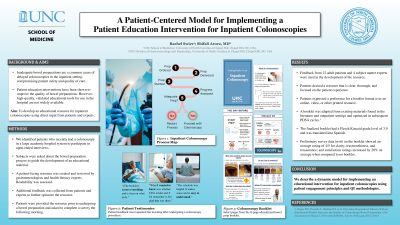Back


Poster Session D - Tuesday Morning
Category: General Endoscopy
D0280 - A Patient-Centered Model for Implementing a Patient Education Intervention for Inpatient Colonoscopies
Tuesday, October 25, 2022
10:00 AM – 12:00 PM ET
Location: Crown Ballroom

Has Audio

Rachel M. Swier
University of North Carolina School of Medicine
Chapel Hill, NC
Presenting Author(s)
Rachel M. Swier, 1, Shifali Arora, MD2
1University of North Carolina School of Medicine, Chapel Hill, NC; 2University of North Carolina at Chapel Hill, Chapel Hill, NC
Introduction: Inadequate bowel preparations are a common cause of delayed colonoscopies in the inpatient setting, compromising patient safety and quality of care. Patient education interventions have been shown to improve the quality of bowel preparations. However, high-quality, validated educational tools for use in the hospital are not widely available. As part of a quality improvement initiative, we aimed to develop an educational resource for inpatient colonoscopies using direct input from patients and subject matter experts from conception to roll out.
Methods: We identified patients who recently had a colonoscopy in a large academic hospital system to participate in open-ended interviews. Consented subjects were asked general questions about the bowel preparation process and specific questions to guide the development of an educational tool. A patient-facing resource was created and reviewed by subject matter experts in Gastroenterology and health literacy. Readability was assessed using a validated measure. In a series of Plan-Do-Study-Act (PDSA) cycles, additional feedback was collected from patients and experts to further optimize the resource. The finalized resource was provided to hospitalized patients undergoing bowel preparation for a colonoscopy. Patients were later asked to complete a survey on their experience with the tool.
Results: Feedback from 12 adult patients and 4 subject matter experts were used in the development of the resource. Patients desired a resource that is clear, thorough, and focused on the patient experience. Most patients expressed a preference for a booklet format over an online, video, or other printed resource. A booklet was adapted from existing materials found in the literature and outpatient settings and optimized in subsequent PDSA cycles.1 The finalized booklet had a Flesch Kincaid grade level of 3.9. Preliminary survey data (n=6) on the booklet showed an average rating of 4/5 for clarity, trustworthiness, and reassurance; and satisfaction ratings increased by 20% on average when compared to no booklet.
Discussion: We describe a dynamic model for implementing an educational intervention for inpatient colonoscopies using patient engagement principles and quality improvement methodologies.
References:
1. Ergen WF, Pasricha T, Hubbard FJ, et al. Providing Hospitalized Patients With an Educational Booklet Increases the Quality of Colonoscopy Bowel Preparation. Clin Gastroenterol Hepatol. 2016;14(6):858-864. doi:10.1016/j.cgh.2015.11.015
Disclosures:
Rachel M. Swier, 1, Shifali Arora, MD2. D0280 - A Patient-Centered Model for Implementing a Patient Education Intervention for Inpatient Colonoscopies, ACG 2022 Annual Scientific Meeting Abstracts. Charlotte, NC: American College of Gastroenterology.
1University of North Carolina School of Medicine, Chapel Hill, NC; 2University of North Carolina at Chapel Hill, Chapel Hill, NC
Introduction: Inadequate bowel preparations are a common cause of delayed colonoscopies in the inpatient setting, compromising patient safety and quality of care. Patient education interventions have been shown to improve the quality of bowel preparations. However, high-quality, validated educational tools for use in the hospital are not widely available. As part of a quality improvement initiative, we aimed to develop an educational resource for inpatient colonoscopies using direct input from patients and subject matter experts from conception to roll out.
Methods: We identified patients who recently had a colonoscopy in a large academic hospital system to participate in open-ended interviews. Consented subjects were asked general questions about the bowel preparation process and specific questions to guide the development of an educational tool. A patient-facing resource was created and reviewed by subject matter experts in Gastroenterology and health literacy. Readability was assessed using a validated measure. In a series of Plan-Do-Study-Act (PDSA) cycles, additional feedback was collected from patients and experts to further optimize the resource. The finalized resource was provided to hospitalized patients undergoing bowel preparation for a colonoscopy. Patients were later asked to complete a survey on their experience with the tool.
Results: Feedback from 12 adult patients and 4 subject matter experts were used in the development of the resource. Patients desired a resource that is clear, thorough, and focused on the patient experience. Most patients expressed a preference for a booklet format over an online, video, or other printed resource. A booklet was adapted from existing materials found in the literature and outpatient settings and optimized in subsequent PDSA cycles.1 The finalized booklet had a Flesch Kincaid grade level of 3.9. Preliminary survey data (n=6) on the booklet showed an average rating of 4/5 for clarity, trustworthiness, and reassurance; and satisfaction ratings increased by 20% on average when compared to no booklet.
Discussion: We describe a dynamic model for implementing an educational intervention for inpatient colonoscopies using patient engagement principles and quality improvement methodologies.
References:
1. Ergen WF, Pasricha T, Hubbard FJ, et al. Providing Hospitalized Patients With an Educational Booklet Increases the Quality of Colonoscopy Bowel Preparation. Clin Gastroenterol Hepatol. 2016;14(6):858-864. doi:10.1016/j.cgh.2015.11.015
Disclosures:
Rachel Swier indicated no relevant financial relationships.
Shifali Arora indicated no relevant financial relationships.
Rachel M. Swier, 1, Shifali Arora, MD2. D0280 - A Patient-Centered Model for Implementing a Patient Education Intervention for Inpatient Colonoscopies, ACG 2022 Annual Scientific Meeting Abstracts. Charlotte, NC: American College of Gastroenterology.
